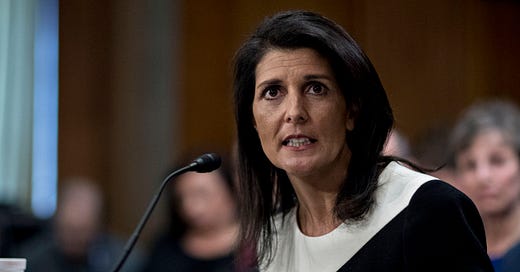The Constitution Absolutely Prohibits Nikki Haley From Being President Or Vice President
Nikki Haley’s flagrant defiance of the Constitution’s textual prerogative, if allowed to continue, will thrust all that remains of the Framers’ now-enervated handiwork into inexorably aimless waters.
Please consider upgrading your subscription here, or subscribe to my Newsletter if you have not done so already, to help me keep producing content of the highest possible quality. Your financial contributions, whether via an annual or monthly subscription or gift, are greatly appreciated and truly go a long way to helping me keep my writings available to everyone, free of charge. Thank you in advance for your generosity! God bless!
The question of Presidential eligibility under the Constitution has been a hot button one, especially in recent years with the controversial campaigns of John McCain, Barack Obama, Ted Cruz, and most recently, Kamala Harris. The controversy arises from the text of the Constitution itself. Article II, Section 1 stipulates that “No Person except a natural born Citizen, or a Citizen of the United States, at the time of the Adoption of this Constitution, shall be eligible to the Office of President.” The core issue centers on the meaning of the phrase “natural born Citizen.” The Constitution explicitly lays out three requirements to run for president: (i) be at least 35 years old; (ii) have been a resident of the United States for at least 14 years; and (iii) be a natural-born citizen of the United States.
The question of natural born citizenship is crystal clear, though often gets confused with the more controversial debate surrounding birthright citizenship. From the outset, it should be stressed that the two are entirely different constitutional considerations. The legal question of natural born citizenship, as an eligibility requirement for president, is well-settled law, whereas the birthright citizenship issue is still up in the air.
There is a reason the Founding Fathers attached the requirement of being a “natural born Citizen” to the President (and with the passage of the Twelfth Amendment, the Vice President) only, and no other federal offices. The idea was to elevate the threshold for the highest elected political office of the land – notably, that language is absent in Article I, which stipulates that lawmakers running for the House or Senate need only be a “citizen” to qualify. The early debates surrounding passage of the Constitution add support for the view that the Framers wanted to exclude “the admission of Foreigners into the administration of our national Government,” as John Jay wrote to George Washington in July of 1787.
A central concern for the founders of the nascent American republic was that only the most qualified statesmen be eligible for the country’s highest office. In his Commentaries, Joseph Story elaborated that “[i]t is indispensable … that the president should be a natural born citizen of the United States …. [T]he general propriety of the exclusion of foreigners, in common cases, will scarcely be doubted by any sound statesman.” Joseph Story, who enjoyed over a thirty-year reign as an associate Supreme Court justice, famously elaborated the principles of the republicanism of Alexander Hamiton and John Marshall well into the mid-nineteenth century. His Commentaries specifically distinguished between natural born and naturalized citizens, the latter of whom were ineligible to run for president, despite qualifying for all the privileges of citizenship. This view is supported by the best legal commentary of the day, Emmerich de Vattel’s Law of Nature and of Nations, an authority for the Founding Fathers on questions of citizenship. de Vattel’s work states that “[t]he natives, or natural-born citizens, are those born in the country, of parents who are citizens.” The question of natural born citizenship is ergo fundamentally distinct from the ongoing issue of birthright citizenship, raised in the Fourteenth Amendment, which confers citizenship to “[a]ll persons born or naturalized in the United States.” The key word here is barebones citizenship, not eligibility for the presidential office, which, as noted earlier, demands a much higher threshold for qualification.
The CO Supreme Court just banned President Trump from the ballot! They are deliberately interfering with the election on behalf of Crooked Joe Biden, and eliminating the rights of Colorado voters to vote for the candidate of their choice. Donate now to help keep Donald Trump on the ballot!
Modern legal scholars have further elaborated the meaning of the Presidential Eligibility Clause. For example, in a 2008 article published by the Michigan Law Review, Law Professor Lawrence Solum argued that the generally agreed upon meaning of the relevant article was that “anyone born on American soil whose parents are citizens of the United States is a ‘natural born citizen’.”
John Eastman has also raised the issue of natural born citizenship in the related context of Kamala Harris’ eligibility to serve as Vice President. In a 2020 Newsweek article, Eastman argued that Harris would only qualify as a constitutionally eligible natural-born citizen if her parents were “lawful permanent residents at the time of her birth.” However, in the case of Harris, if her parents were “merely temporary visitors,” then she patently did not qualify as a natural-born citizen pursuant to Article II, Section 1. The logic of Eastman’s argument is straightforward, and I would maintain does not even need to implicate the Fourteenth Amendment, and the outstanding question of birthright citizenship, which might otherwise detract from the fundamental soundness of the relevant constitutional concern.
It makes sense that the Constitution’s architects did not license the presidency to anyone born on U.S. soil. The specific requirement of natural-born citizenship, which is absent for both members of Congress and the judiciary, was intended to raise the threshold for presidential officeholders in particular. In Nikki Haley’s case, it is well-documented that neither one of her parents were citizens, natural born or naturalized, at the time of her birth, in 1972. Investigative journalist Laura Loomer previously reported that a South Carolina-based newspaper included a quote from the Office of Nikki Haley in 2015, stating that “her parents were not U.S. Citizens at the time of her birth in 1972 and did not become citizens until 1978 and 2003” (read Loomer’s full report breaking down Haley’s parents’ citizenship and legal analysis here). Thus, although the parents may have been lawful residents at the time of her birth on South Carolina soil, which may or may not confer Haley with the privileges of citizenship, importantly, it is obvious that she does not qualify for the Constitution’s higher requirement of natural-born citizenship.
In addition, the Twelfth Amendment states that “no person constitutionally ineligible to the office of President shall be eligible to that of Vice-President of the United States.” In short, because Haley is ineligible to serve as president, having not satisfied the Presidential Eligibility Clause, she also cannot serve as vice president. Now, the vast majority of legal scholarship offering an opinion to the contrary will cite the seminal Supreme Court decision, Wong Kim Ark. However, there, the relevant issue was not whether someone whose natural born citizenship was in question might serve in the highest office of the land, but rather, whether such a person was entitled to the bare minimums of American citizenship. Thus, the legal issues are completely different. The Court in Wong Kim Ark decided whether citizenship might be conferred upon an individual born on American soil to non-citizen parents. Importantly, in Wong Kim Ark, nowhere does the Court ever state that natural-born citizens are synonymous with citizens. While numerous equivalences are made between “natural-born” citizens (or “subjects”; the terms are used interchangeably throughout, even though there is a relevant legal distinction) and citizens, the Court notably took pains to distinguish between the two categories, merely analogizing the two for the purposes of ultimately arguing in favor of birthright citizenship. Regardless of the ultimate legitimacy of the decision, which many constitutional scholars have contested over the intervening years, the important takeaway is that even in Wong Kim Ark, the supposed authority in favor of Haley’s eligibility to run for President, the Court never asserted that birthright citizenship would hereinafter absorb and eradicate the distinct category of “natural-born” citizenship.
It may well be argued that the reason the Court in Wong Kim Ark upheld that distinction was that it contemplated future cases like Nikki Haley’s, where a non-natural-born citizen might ask not merely for the bare minimum rights of citizenship, but additional rights, namely the right to be eligible to run for president, which runs afoul of both the textual prerogative and original meaning of the Constitution itself. The logic of this is intuitive: it does not follow that from the conferral of the bare necessities of American citizenship, consistent with the principles of natural right, that additional constitutional privileges must also be granted. Nature, in other words, does not automatically confer one with the presidential office, nor the bare minimum duties, such as age and time residing in the country requirements, that the Framers wrote into the Presidential Eligibility Clause.
The Framers had a robust understanding of natural right. They fiercely upheld the view that duties must be imposed on the body politic in general, and certain outstanding statesmen in particular, in order to meet the higher demands of elected office. Doing so would, they hoped, perpetuate the original social contract for posterity. To the extent that model has irreparably broken down in modern times, it is because of flagrant violations lawmakers, like Nikki Haley and Kamala Harris, have committed in the subsequent centuries against the Constitution’s intended meaning. This has gradually whittled the Framers’ once robust tapestry down to the bone, producing a crisis whereby persons, with no historical awareness nor reverence for the Constitution’s textual meaning or purpose, openly defy its conditions willy-nilly, out of personal vanity or even resentment. Nikki Haley’s flagrant defiance of the Constitution’s textual prerogative, if left unchecked, will further erode what remnants of that original tapestry survive, thrusting all that remains of the Framers’ now enervated handiwork into inexorably aimless waters.
Sponsorship: The House just voted to formally open an impeachment inquiry into President Biden. The facts don’t lie. It’s time to get the American people answers. Help House Republicans in this fight - Add your name to join the millions of Americans who want a full investigation into the Biden Crime Family!
CLICK HERE TO SIGN.
Order your Patriot Cigars today at mypatriotcigars.com and use Promo Code: TRUMPWON for 15% OFF!
A slightly modified version of this piece was originally published in American Greatness, and can be found here.
Paul Ingrassia is a Law Clerk at The McBride Law Firm, PLLC. He graduated from Cornell Law School in 2022 and is on the Board of Advisors of the New York Young Republican Club. He is also a two-time Claremont Fellow. Follow him on Twitter @PaulIngrassia, Substack, Truth Social, and Rumble.









Consistent with the earlier decisions, in 1939, the U.S. Supreme Court stated in its decision in Perkins v. Elg that a person born in the United States and raised in another country was a natural born citizen.
The Supreme Court decision in 1939 is the latest so it takes precedent. Unless my history is wrong, 1939 came after 1875. I can't believe how many people on this post either can't read or do math.
You are continuing to show your ignorance. How about the Supreme Court? I guess you didn't read that far. The Supreme Court states if you were born in the Unites States no matter whether you were raised in the United States or in another country you are a natural born citizen. That is the highest courts decision. Incase you are too stupid to understand The Supreme Court is a federal court.
Consistent with the earlier decisions, in 1939, the U.S. Supreme Court stated in its decision in Perkins v. Elg that a person born in the United States and raised in another country was a natural born citizen.